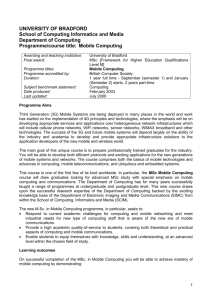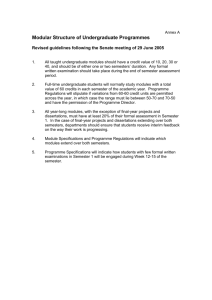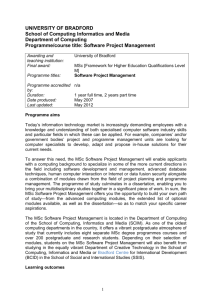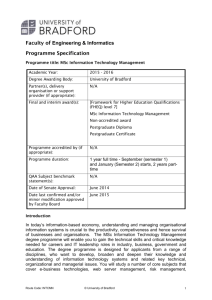MSc Software Engineering
advertisement
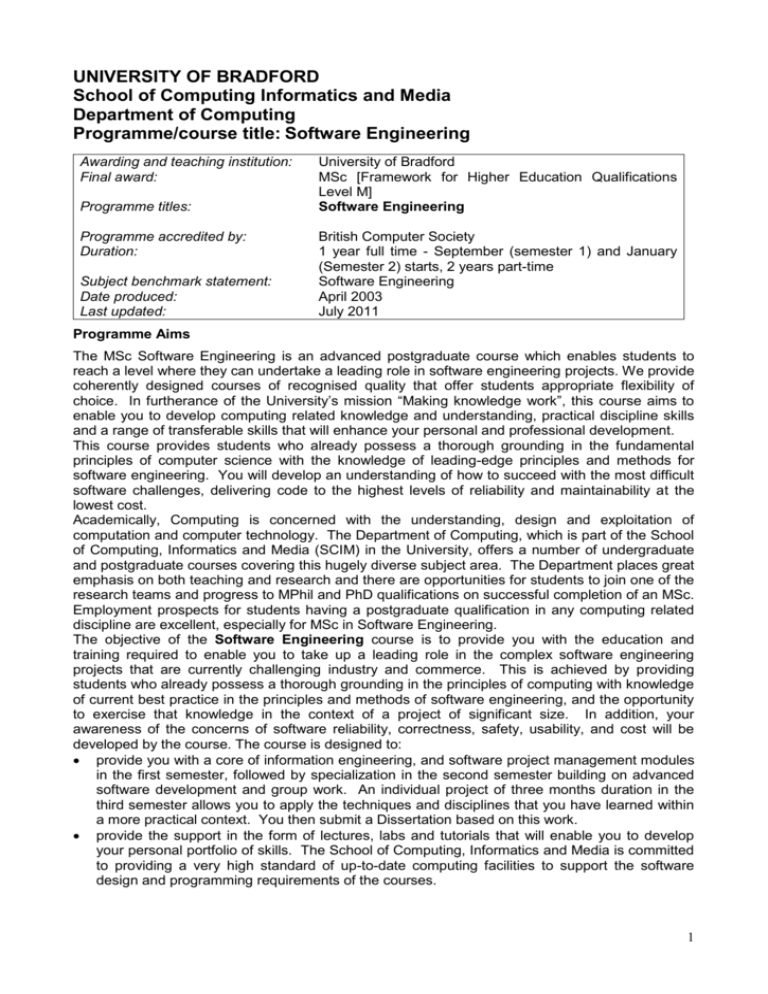
UNIVERSITY OF BRADFORD School of Computing Informatics and Media Department of Computing Programme/course title: Software Engineering Awarding and teaching institution: Final award: Programme titles: Programme accredited by: Duration: Subject benchmark statement: Date produced: Last updated: University of Bradford MSc [Framework for Higher Education Qualifications Level M] Software Engineering British Computer Society 1 year full time - September (semester 1) and January (Semester 2) starts, 2 years part-time Software Engineering April 2003 July 2011 Programme Aims The MSc Software Engineering is an advanced postgraduate course which enables students to reach a level where they can undertake a leading role in software engineering projects. We provide coherently designed courses of recognised quality that offer students appropriate flexibility of choice. In furtherance of the University’s mission “Making knowledge work”, this course aims to enable you to develop computing related knowledge and understanding, practical discipline skills and a range of transferable skills that will enhance your personal and professional development. This course provides students who already possess a thorough grounding in the fundamental principles of computer science with the knowledge of leading-edge principles and methods for software engineering. You will develop an understanding of how to succeed with the most difficult software challenges, delivering code to the highest levels of reliability and maintainability at the lowest cost. Academically, Computing is concerned with the understanding, design and exploitation of computation and computer technology. The Department of Computing, which is part of the School of Computing, Informatics and Media (SCIM) in the University, offers a number of undergraduate and postgraduate courses covering this hugely diverse subject area. The Department places great emphasis on both teaching and research and there are opportunities for students to join one of the research teams and progress to MPhil and PhD qualifications on successful completion of an MSc. Employment prospects for students having a postgraduate qualification in any computing related discipline are excellent, especially for MSc in Software Engineering. The objective of the Software Engineering course is to provide you with the education and training required to enable you to take up a leading role in the complex software engineering projects that are currently challenging industry and commerce. This is achieved by providing students who already possess a thorough grounding in the principles of computing with knowledge of current best practice in the principles and methods of software engineering, and the opportunity to exercise that knowledge in the context of a project of significant size. In addition, your awareness of the concerns of software reliability, correctness, safety, usability, and cost will be developed by the course. The course is designed to: provide you with a core of information engineering, and software project management modules in the first semester, followed by specialization in the second semester building on advanced software development and group work. An individual project of three months duration in the third semester allows you to apply the techniques and disciplines that you have learned within a more practical context. You then submit a Dissertation based on this work. provide the support in the form of lectures, labs and tutorials that will enable you to develop your personal portfolio of skills. The School of Computing, Informatics and Media is committed to providing a very high standard of up-to-date computing facilities to support the software design and programming requirements of the courses. 1 develop discipline skills and personal transferable skills so that on graduation you may move directly into responsible positions in industry or commerce, or may pursue further programmes of study. promote educational opportunities for ethnic minorities, women, mature and alternatively qualified students, as well as for school-leavers and traditionally qualified students. Learning outcomes You will gain mastery of Software Engineering fundamentals and principles, learn how to apply them to the analysis of problems and how to plan, implement and evaluate the solutions by demonstrating: Knowledge and understanding at advanced level of the concepts and theories of software engineering including information engineering, software development, software project management, human-computer interaction and formal methods. You will develop a firm grasp of the mathematical foundations of software engineering and how they underpin the formal specification and modelling of computer systems. Discipline Specific Skills; Creative and systematic problem solving. Ability to analyse problems and develop creative solutions; ability to develop an object oriented approach to their solution; to develop computer programs using object oriented programming languages; to develop applications for the World Wide Web and to choose which programming languages to use for specific applications; an ability to manage and/or contribute to a team approach to software engineering projects. Personal and Transferable Skills in information management, interpretation and presentation; IT and communications skills; report writing and presentation skills: creative and systematic problem solving; teamwork and leadership; project management; and personal management. The Curriculum Typically for a taught Masters programme, the course lasts for 12 months of full-time study (two semesters of instruction through a series of modules all of which are integrated to form a complete and coherent course of study, followed by completion of a major dissertation project in the summer) or 24 months of part-time study following a similar pattern. The MSc Software Engineering covers a range of specialist topics, leading to the qualification of a Master's degree. Typically, a taught full-time Master's course lasts for twelve months of full-time study. The course has two stages: the taught courses stage which takes place during the first two semesters (or four semesters for the part-time route), and the project/dissertation stage. The taught courses stage is organised on a modular basis. Students who successfully complete the taught modules are eligible for the PGDip Software Engineering. Students proceeding onto the Masters level undertake a project which the student has to agree with the Department during the first taught semesters. The map of your studies is detailed below. For the full time path, in each of the first two semesters, modules accounting for 60 credits are studied. For each module, all of the teaching and assessment is undertaken in the same semester. Dissertation project work lasting for three months is undertaken in the final semester. This accounts for a further 60 credits in the assessment. Due to the advanced nature of this MSc, you are allocated a supervisor for your project whose research interests best match the project area. The project is assessed by means of a viva voce examination and a dissertation report. Note that, for September (semester 1) start students, the full-time programme periods are September to January, January to May, and May to September. For January (semester 2) start students, the full-time programme periods are January to May, September to January, and January to May. The full-time programme is structured to normally take one academic year as shown in the table(s) below. There are taught modules for 60 credits during semesters 1 and 2. From these, optional modules across semesters 1 & 2 may be chosen as detailed below. These should normally be level M modules, but students may select up to 20 credits of level 3 modules if appropriate. 2 Course Structure for September (semester 1) start only: Unit Code CM1032D CM1019D CM1013D CM0602D Credit 20 20 20 20 Sem 1 1 1 1 Level M M M M CM0518D CM1033D CM1020D CM1044D CM0328D CM1034D 20 20 20 20 20 20 2 2 2 2 2 2 3 M M M 3 M CM1009D CM0422D CM0423D CM0424Z 20 20 20 60 2 2 2 DISS M M M M Module Title Information Engineering (PG) C* Formal Methods (PG) C* Software Project Management C Network Performance Modelling and Alt Analysis Concurrent and Distributed Systems O Advanced Software Development C* Group Project (SE) C Artificial Intelligence with Applications O AI for Games O* Human Computer Interaction (Design & O* Development) Real Time Systems (PG) O* Web Engineering O Advanced Database Techniques O Dissertation C Course Structure for January (semester 2) start only: Unit Code CM1033D CM1020D CM1044D CM0328D CM1034D Credit 20 20 20 20 20 Sem 2 2 2 2 2 Level M M M 3 M Module Title Advanced Software Development C* Group Project (SE) C Artificial Intelligence with Applications O AI for Games O* Human-Computer Interaction (Design O* & Development) CM1009D 20 2 M Real Time Systems (PG) O* CM0422D 20 2 M Web Engineering O CM0423D 20 2 M Advanced Database Techniques O CM1032D 20 1 M Information Engineering (PG) C* CM1019D 20 1 M Formal Methods (PG) C* CM1013D 20 1 M Software Project Management C CM0602D 20 1 M Network Performance Modelling and Alt Analysis CM0518D 20 2 3 Concurrent and Distributed Systems O CM0424Z 60 2 M Dissertation C C* Core module which is compulsory unless studied previously. In the case of ‘Advanced Software Development’ students should not previously have studied ‘Programming Language Theory and Semantics’ (CM0516D) O* - Optional unless previously studied. Note that students may only study either ‘Concurrent and Distributed Systems’ or ‘AI for Games’ but not both as these are level 3 modules. ‘AI for Games’ and ‘AI with Applications’ are also mutually exclusive. The curriculum may change, subject to the University's course approval, monitoring and review procedures. Assessment regulations: a summary To be eligible for a Postgraduate Diploma award you must achieve at least 40% in 100 credits and at least 35% in the other 20 credits relating to the modules taken in semesters 1 and 2. Students who attain an overall average of at least 60% in the initial attempt will be eligible for the award of Postgraduate Diploma with Merit. Additionally, students who attain an overall average of at least 70% in the initial attempt will be eligible for the award of Postgraduate Diploma with Distinction. 3 To be eligible for an MSc Degree you must achieve at least 40% in 100 credits and at least 35% in the other 20 credits taken in semesters 1 and 2 and achieve at least 40% in the project (Dissertation). Students who attain an overall weighted average of at least 60% at the initial attempt, including at least 60% at the initial attempt in the project shall be eligible for the award of the Degree of MSc with Merit. Students who attain an overall average of 70% in the units concerned at the initial attempt, including at least 70% in the project, will be eligible for the award of MSc with Distinction. Comprehensive information about the University of Bradford’s Regulation Governing Postgraduate Taught Courses is available on the web at http://www.brad.ac.uk/admin/acsec/QA_Hbk/Postgrad_Taught_Regs.html Teaching, learning and assessment strategies You will experience a wide range of teaching and learning environments. Concepts, principles and theories are generally explored in formal lectures, practiced in associated tutorials and seminars, and demonstrated in laboratory classes. Practical skills are developed in laboratory sessions and professional and personal skills are implicitly developed throughout the course in both group work and presentations. The individual project, consisting of a design phase (Project part 1) and an implementation phase (Dissertation) brings various aspects of your course together in a major software engineering exercise. The course is supported by laboratories with up-to-date hardware and software with regular update and replacement cycles; Each 20-credit module on the course requires you to commit 200 hours of study. Some of these hours will be formally timetabled – lectures, laboratories, seminars and tutorials – and others will involve you in private study. In keeping with the level of the course it is expected that you will develop a capacity for independent study as the course progresses. Admission Requirements The procedures, criteria and regulations for admission to these programmes of study operate within the parameters defined by the University’s Ordinance for Postgraduate Courses. However, with respect to the proposed programmes, we specifically require that all applicants: have a good (normally 2:2 or above) Honours Degree or equivalent qualification in Software Engineering or containing a significant component in Software Engineering of an approved degree-awarding body; or have a good (normally 2:2 or above) Honours Degree in a subject slightly related to Computing or Software Engineering subject and can demonstrate sufficient relevant industrial experience in Software Engineering. Candidates applying to the course with non-standard qualifications will be judged on an individual basis using the University's APEL procedures. In addition, a test of written and spoken English normally needs to have been passed at grade 6.0 for IELTS or 550 for TOEFL (or 250 for the computer-based test). Student Support and Guidance All students admitted to the School of Computing, Informatics and Media go through a process of induction that includes detailed talks by the Dean and Head of Department. Afterwards, ongoing support for students is provided in the form of one-stop facilities located at the School of Computing, Informatics and Media Student Support Office (SSO), open throughout the day during term, and in the mornings and afternoons outside term. Support for registered students also is provided 24/7 via the intranets of the School of Computing, Informatics and Media, Department of Computing and the School’s Technical Support. The School also uses the University’s Virtual Learning Environment (VLE) known as Blackboard to support students via their individual modules. All students on our Postgraduate Programmes will be allocated a personal tutor who provides support and guidance on matters relating to learning, teaching, and academic progress. There are tutors in the School who deal with issues where other social factors (relating to gender or disability for example) may impact on a student’s academic performance. The Student Staff Liaison Committee gives the opportunity for students to give formal feedback to the Course Tutor and/or department about curricular and/or general issues in the running of the programme. 4 Further Information More details about our MSc Software Engineering may be obtained from the School of Computing, Informatics and Media Admissions Office via telephone on +44 (0)1274 234286, email pgadmissions@bradford.ac.uk, or our website at http://www.scim.brad.ac.uk/courses/pg/ If you require further information about the University of Bradford, please refer to its Postgraduate Prospectus. The university web site can be accessed at http://www.brad.ac.uk Further information on degree opportunities available at the School of Computing, Informatics and Media can be found on http://www.scim.brad.ac.uk/ and, similarly, further information on courses available at the Department of Computing can be found at http://www.comp.brad.ac.uk/ Disclaimer The details of this Programme Specification and information contained therein are subject to change in accordance with the University of Bradford’s course approval, monitoring and review procedures. 5

